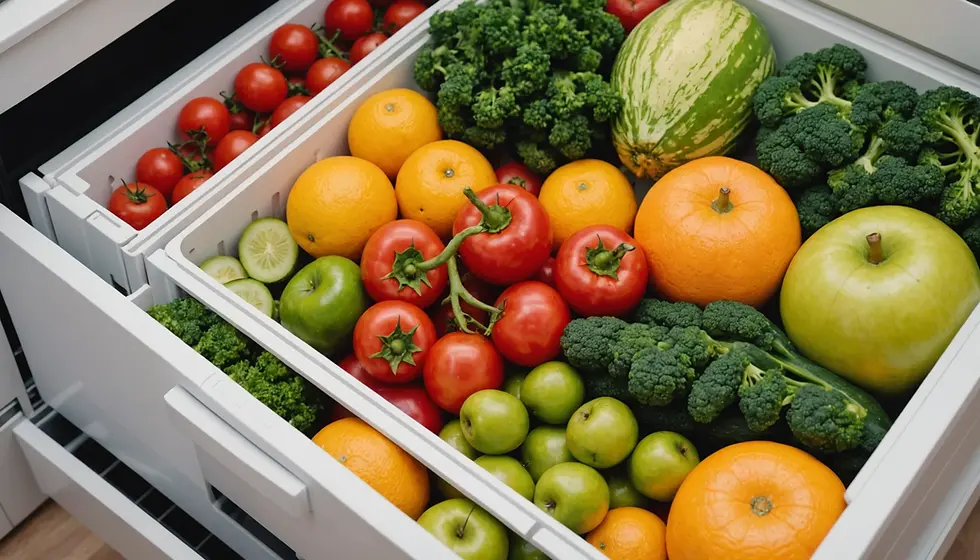- Feb 1, 2025
- 3 min read
Updated: Apr 3, 2025

Local farming has gained remarkable importance in today's society. It is vital not just for health-conscious shoppers but also for the economy and the environment. More consumers are curious about where their food comes from and choose local farmers to fulfill their grocery needs. This post uncovers the numerous benefits of supporting local farming, often overlooked amid the larger agricultural discussions.
Economic Support for the Community
Choosing local farming leads to direct economic benefits for communities. A significant study from the USDA found that every dollar spent at a local farm generates over $2.50 in economic activity within the community. When you buy from local farmers, a larger share of your money remains in the community, helping to support local businesses and create jobs.
Local farmers frequently purchase supplies from nearby vendors, helping to build a thriving ecosystem. This interconnectedness fosters a resilient local economy, which is crucial during economic challenges. Additionally, local farming encourages entrepreneurship. New farms and food-related businesses can sprout up, contributing to a sustainable economic framework that benefits everyone.
Fresh and Nutritious Produce
With local sourcing, consumers enjoy fresher and more nutritious produce. Farmers often harvest their crops at peak ripeness, which leads to fruits and vegetables bursting with flavor and nutrients. For instance, tomatoes picked at peak ripeness can contain up to 50% more vitamin C compared to those harvested early for long transport times.
Research shows that food can lose nutritional value within hours of being picked, especially during extensive transportation. By supporting local farming, you replenish your diet with fresh ingredients that are not only tastier but also healthier for you.
Environmentally Friendly Practices
Local farming plays a crucial role in promoting environmental sustainability. Many local farmers practice methods that minimize their carbon footprint, including crop rotation and organic farming. These practices can lead to healthier soil and enhanced biodiversity.
Choosing local produce also reduces transportation distances, and studies show that transportation can account for over 25% of a food’s total carbon footprint. Buying food grown nearby means fewer emissions and a reduced impact on climate change. Sustainable local farms make better use of resources, ensuring that their practices are kind to the environment.
Enhanced Taste and Variety
Supporting local farmers introduces consumers to an exciting range of tastes and textures. Local farms often produce unique heirloom varieties that big-box grocery stores do not carry. For example, local varieties of corn or squash can have distinct flavors and culinary uses, enhancing the variety available to home cooks.
Exploring these local offerings enriches the community's culinary scene. It encourages residents to try new recipes, discover local favorites, and celebrate the diverse flavors that local farms provide.
Community Connection and Education
Buying local food nurtures a direct relationship between consumers and farmers. Farmers' markets and community-supported agriculture (CSA) programs provide a platform for people to interact with local growers. This connection builds trust and transparency in the food system.
Such relationships lead to greater public awareness about agricultural practices, seasonal foods, and the importance of sustainability. Knowing where food comes from empowers consumers to make informed decisions. Furthermore, community events—like farm tours and workshops—educate everyone, especially children, about agriculture, ecology, and healthy eating habits.
Supporting Local Culture and Heritage
Local farming often embodies the unique culture and heritage of a region. Traditional farming methods and crops represent the community's history, lifestyle, and values. By supporting local farmers, you help preserve these practices for future generations.
These cultural connections enhance community bonding, fostering a vibrant social environment. Local harvest festivals and fairs create opportunities for individuals to come together, celebrating what their region has to offer.
Resilience Against Global Challenges
Local farming brings resilience against global issues like climate change and economic fluctuations. By focusing on local food systems, communities can adapt to food shortages or price changes more effectively.
When communities rely on local supplies, they become less vulnerable to external shocks, such as market instability or global events like pandemics. Investing in local farms is a significant step toward building a resilient community that invests in itself.
Embracing the Local Food Movement
The benefits of local farming extend beyond what is stocked at grocery stores. From boosting local economies to providing fresh produce, sustainable practices, and fostering community connections, local farming plays a vital role in creating healthier environments and societies.
As consumers become more aware of the impacts of their purchasing habits, supporting local farmers leads to transformative changes in communities. This increased awareness fosters a deeper appreciation for food and the people who cultivate it. By choosing local over mass-produced items, we nourish not only ourselves but also our communities and the planet.
Every bite of locally sourced food is a commitment to a robust, sustainable food system that intertwines health and community well-being.




Comments